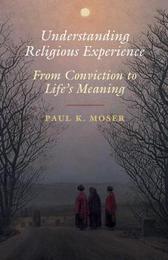
|
Understanding Religious Experience: From Conviction to Life's Meaning
Hardback
Main Details
| Title |
Understanding Religious Experience: From Conviction to Life's Meaning
|
| Authors and Contributors |
By (author) Paul K. Moser
|
| Physical Properties |
| Format:Hardback | | Pages:357 | | Dimensions(mm): Height 235,Width 159 |
|
| Category/Genre | Philosophy of religion |
|---|
| ISBN/Barcode |
9781108471428
|
| Classifications | Dewey:204.2 |
|---|
| Audience | | Tertiary Education (US: College) | | Professional & Vocational | |
|---|
| Illustrations |
Worked examples or Exercises
|
|
Publishing Details |
| Publisher |
Cambridge University Press
|
| Imprint |
Cambridge University Press
|
| Publication Date |
5 December 2019 |
| Publication Country |
United Kingdom
|
Description
In this book, Paul K. Moser offers a new approach to religious experience and the kind of evidence it provides. Here, he explains the nature of theistic and non-theistic experience in relation to the meaning of human life and its underlying evidence, with special attention given to the perspectives of Tolstoy, Buddha, Confucius, Krishna, Moses, the apostle Paul, and Muhammad. Among the many topics explored in this timely volume are: religious experience characterized in a unifying conception; religious experience naturalized relative to science; religious experience psychologized in merely psychological phenomena; and religious experience cognized relative to potential defeaters from evil, divine hiddenness, and religious diversity. Understanding Religious Experience will benefit those interested in the nature of religion and can be used in relevant courses in religious studies, philosophy, theology, Biblical studies, and the history of religion.
Author Biography
Paul K. Moser is Professor of Philosophy at Loyola University, Chicago. He has published widely, most recently as author of The God Relationship (Cambridge, 2018) and co-editor of The Cambridge Companion to the Problem of Evil (Cambridge, 2017). He serves as editor of Cambridge Studies in Religion, Philosophy, and Society and Elements in Religion and Monotheism.
Reviews'This book is noteworthy for its clarity of expression and systematic approach to the subject of religious experience.' R. Ward, Choice
|